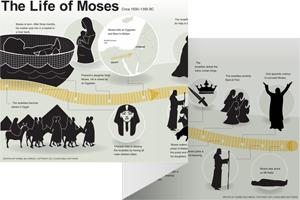77:title–20 In this individual lament psalm, the psalmist describes the comfort he has found by remembering how God helped the Israelites. The psalmist begins by depicting his anguish and pleading to God (vv. 1–3). He then describes his sleepless turmoil (v. 4) and his efforts to find some insight and resolution to his struggle (vv. 5–6). He describes a time in the past when he struggled, recalling the questions he asked regarding God’s inaction (vv. 7–9). The psalmist then recalls how he focused on God’s past actions on behalf of Israel (vv. 10–12). He considers God’s character and shifts from an individual perspective to a corporate (group) viewpoint as he recalls God’s actions (v. 13). He then describes God’s actions across history (vv. 14–15) developing imagery about God’s power (vv. 16–19). The psalmist concludes by focusing on the events during the time of the exodus (v. 20). |
77:title music director See note on 4:title.
on Jeduthun See note on 39:title.
Of Asaph See note on 73:title.
77:1–3 Psalm 77 opens with a pained sense of desperation. The psalmist is unable to find any solace in his attempts to approach God or his examination of his personal experience of God. |
77:2 In the day I have trouble In the Hebrew text, the psalmist sets up a day-and-night bookend to describe the constant nature of his ongoing crisis.
At night my hand stretches out The psalmist portrays his crisis as something that dominates every moment of his life—he cannot find relief or sleep.
my soul refuses to be comforted The situation that troubles the psalmist will not let up—he cannot get away from it.
77:3 my spirit grows faint The psalmist cannot find solace even by focusing on God.
77:4–9 The psalmist tries to understand his suffering, but he finds no relief. His reflection culminates in a series of pointed questions about his difficulties (vv. 7–9). |
77:4 You hold open my eyelids It is unclear whether the psalmist’s sleeplessness results from God’s direct action or from His inaction. Either way, the psalmist attributes his difficulty to God, and he begs for His help.
77:5 I think about the days from long ago The psalmist turns his attention to God’s help of Israel in the past.
77:6 and my spirit searches This is not a casual rehearsal of God’s past help to Israel, but a serious reflection, perhaps intensified by the psalmist’s pain.
77:7 the Lord reject us forever The first of a series of rhetorical questions in vv. 7–9. Yahweh will not reject the psalmist or His people forever; the psalmist implies that he finds hope by considering God’s faithfulness to Israel.
77:8 his loyal love ceased forever See v. 7 and note.
77:10–15 This section is the pivot point of the psalm. The psalmist makes two significant choices: He chooses to view his difficulties in light of God’s past help to Israel rather than his present anguish (vv. 10–11), and he chooses to interpret his struggles in terms of God’s relationship to the entire nation of Israel (v. 13). |
77:10 the right hand of Refers to God’s pattern of helping Israel.
the Most High See note on 91:1.
77:11 wonders from long ago Often refers to the exodus from Egypt (see Exod 15:11).
77:12 meditate Meditation in the ot involves considering God, and then expressing the fruits of that process. See Ps 104:34 and note.
77:13 O God, your way is distinctive While holiness can have a functional aspect, the psalmist seems to be emphasizing God’s moral character. He considers the record of God’s conduct and recognizes that He is good and upright.
God The psalmist now adopts a corporate (group) perspective, speaking on behalf of God’s people in general.
77:14 the God who works wonders Likely another reference to the exodus from Egypt. Compare v. 11 and note.
77:15 With your arm you redeemed your people This phrase often refers to Yahweh’s actions in the exodus from Egypt (e.g., Deut 4:34).
77:16–20 The psalmist concludes by describing a series of images that draw from the exodus story, especially the crossing of the Red Sea (Exod 14–15), but perhaps also the theophany at Sinai (Exod 19). The connection between this passage and the exodus story culminates in the reference to Moses and Aaron (Psa 77:20). |
77:16 Waters saw you Likely refers to the crossing of the Red Sea (Exod 14). God’s dominance of chaotic waters also echoes some biblical depictions of creation (see Ps 93:3–4).
77:17 The skies thundered Probably alludes to the theophany at Sinai (Exod 19:16).
 Theophany in the Old Testament
Theophany in the Old Testament
Your arrows also flew about Describes lightning (Exod 19:16).
77:19 Your way was through the sea Compare Exod 14:16, 29; 15:19.
77:20 of Moses and Aaron Two brothers who had a pivotal role in rescuing Israel from enslavement in Egypt during the exodus. See Exod 7:1–2.

|
About Faithlife Study BibleFaithlife Study Bible (FSB) is your guide to the ancient world of the Old and New Testaments, with study notes and articles that draw from a wide range of academic research. FSB helps you learn how to think about interpretation methods and issues so that you can gain a deeper understanding of the text. |
| Copyright |
Copyright 2012 Logos Bible Software. |
| Support Info | fsb |
 Loading…
Loading…

